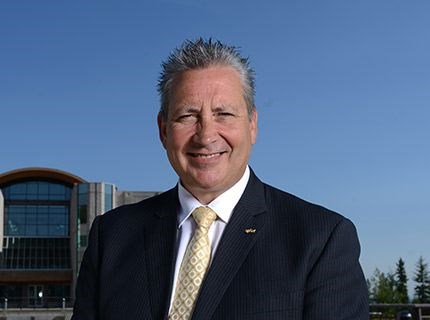What were you doing on June 22, 1990? If you were an MLA, you were raising your hand in support of a motion to create a northern university. It was a simple act that came after an unprecedented social movement in northern British Columbia that changed the course of this region forever.
UNBC is 25 years old today and our first generation is loaded with stories describing the successes of our students, faculty, and alumni. Prior to UNBC's opening, the participation rate of northerners in university was eight per cent, compared to a B.C. average of 21 per cent. Now, nearly 50 per cent of eligible northern high school grads go on to post-secondary education.
We have nearly 12,000 graduates and the majority of them are living and working in northern B.C., contributing their skills and creativity to make our communities better. A recent survey of our graduates indicated just four per cent were unemployed. And the north is retaining about three-quarters of the northerners who go to UNBC and nearly 40 per cent of the non-northerners who attend and graduate from UNBC. Despite this tremendous success in the north, the post-secondary landscape in B.C. is a crowded space, with fewer young people and more degree-granting institutions. The demographic shift occurring in British Columbia is striking.
In 2000-01, there were about 18,000 students in the school district serving Prince George and the surrounding area. In the fall of 2013, that number was just shy of 13,000. While that overall trend holds true across the province, the decline is particularly acute in the North.
In the face of such adversity, there is no better time for universities to be resilient - to plan effectively and to deliver the programming desired by today's students.
Universities are uniquely situated, and not just geographically, to lead the way on a wide range of topics: sustainable resource management, energy production and export, health care delivery, climate change, international trade, economic development, cultural vitality, biodiversity, food security, the availability of fresh water, and more. Universities are global entities, each bringing a unique capacity for problem solving, skill development, and knowledge transfer to effect meaningful change. These are the issues the world expects us to tackle.
To do so, we must remain connected to our communities, forging partnerships that enable us to deliver on this mandate.
Here's one example. Over the last five years, UNBC has been building out an energy system on its campus that uses local sawmill residue and wood pellets to heat most of the Prince George campus. This system is being integrated with UNBC's academic programs to serve as a platform for education, research, and demonstration for northern communities. One potential beneficiary is Hazelton. A group representing hereditary and elected chiefs, municipalities and the regional district, along with the Gitxsan Development Corporation are working with UNBC faculty and students to explore the feasibility and potential benefits of a proposed biomass district heating system to connect a school, recreation centre, hospital, and college campus.
This is just one tangible example of how UNBC's experiences and expertise can assist in realizing the aspirations of communities, and demonstrates my belief that universities and communities have a symbiotic relationship - the prosperity of each is linked indelibly to the other. We must be confident in ourselves, and the communities we serve must have confidence in us. If ever a statement of confidence was made, it was made by UNBC's first Chancellor, Iona Campagnolo, at the opening of our Prince George campus in August 1994.
"This is the hour of the northern people, when we arise from our quiet forests to shake the towers and counsels of the Great."
The message in this line, adapted from J. R. R. Tolkien's writings, was brilliant - it indicated this region was ready for more, ready to do more, and ready to be more.
The Prince George Citizen has been a great advocate for the university over the past quarter century. While reading a book about the creation of UNBC, I came across an editorial from Aug. 18, 1994, the day after Queen Elizabeth II opened the Prince George campus. Some points made by the editor then ring true today: "Universities do not spring fully realized from anyone's imagination, and they certainly don't reach their full potential in a hurry... today is just the first day in the rest of UNBC's life."
I agree - at 25 years of age, your university is just beginning to reach its full potential. In the course of striving to reach that potential, UNBC has become a tremendous resource for the region; we'll need your continued support and engagement to be even better.
-- UNBC president Daniel Weeks



